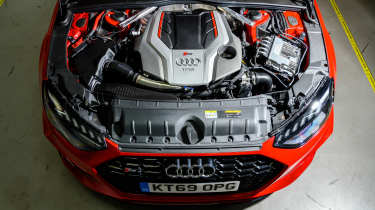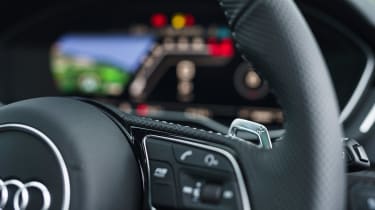Audi RS4 B9 review – engine, gearbox and technical highlights
Porsche-sourced twin-turbo V6 effective, but can be a tad flat
The B9 RS4 came with a 2.9-litre twin-turbocharged V6 engine, co-developed with Porsche, good for 444bhp and 443lb-ft. Not to be confused with the 3-litre twin-turbo unit found in the S4 Avant and saloon of the same generation. Aside from its implementation in the RS4 and RS5, this specific V6 was also found in Porsche’s Cayenne S and Panamera S, as well as the updated ICE Macan Turbo. It’s also expected that this V6 will live on, seeing service in hybridised form, in the new PHEV Audi RS5 and RS5 Avant. Whereas the previous V8 was connected to a dual-clutch transmission, the B9 RS4 made do with an eight-speed torque-converter automatic.
As you’d expect, all four wheels in the B9 RS4 receive power via the usual quattro all-wheel-drive system, split mechanically 40:60 front-rear, although either axle can actively receive more depending on the available grip levels. All UK cars got a Sport Differential, which is able to mechanically vector torque across the rear axle. Suspension was coil springs with adaptive dampers as standard, although Vorsprung models also featured Audi Sport’s Dynamic Ride Control system, which utilises a set of four hydraulically cross-linked dampers for increased support under hard cornering.
Audi’s dynamic steering was also included in the top-spec Vorsprung models, swapping the standard progressive EPAS rack for a speed-variable rack that varies the amount of turns lock-to-lock depending on the road speed.
Of course, the big technical difference between the RS4 and other A4 models of its era is the bespoke body that’s 24mm wider in the RS4. To achieve this, the entire body-in-white is unique to the RS4, with only the bonnet, roof, front doors and tailgate shared with lesser models. A huge investment for a model with relatively low-volume production, but has become a trademark of Audi’s RS4 since the first B5-generation car in 1999.
Filling those arches are wider tracks front and rear, and the enlarged wheel and tyre packages, as well as larger composite brakes or an optional carbon-ceramic set.





